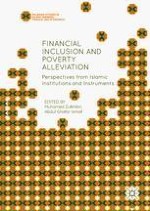
2017 | OriginalPaper | Buchkapitel
1. Quality of Institutions and Inclusive Financial Development in the Muslim World
verfasst von : Muhammad Tariq Majeed
Erschienen in: Financial Inclusion and Poverty Alleviation
Aktivieren Sie unsere intelligente Suche, um passende Fachinhalte oder Patente zu finden.
Wählen Sie Textabschnitte aus um mit Künstlicher Intelligenz passenden Patente zu finden. powered by
Markieren Sie Textabschnitte, um KI-gestützt weitere passende Inhalte zu finden. powered by